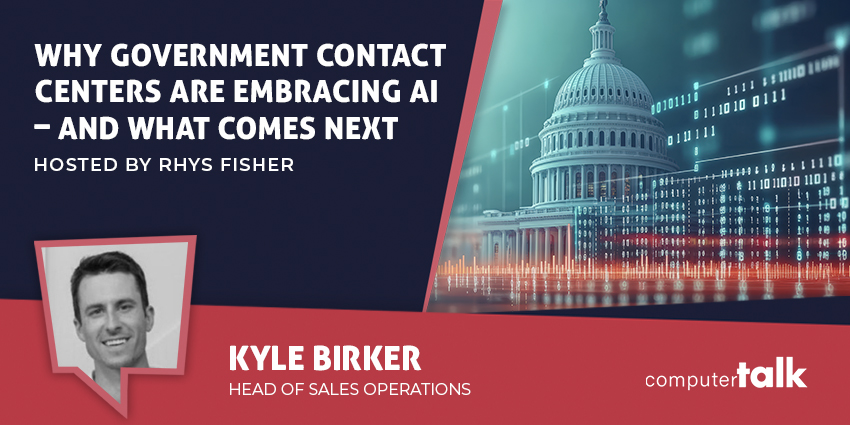August 13, 2025
5 min read
Rhys Fisher
Why Government Contact Centers Are Embracing AI – And What Comes Next
Inside the AI revolution reshaping citizen service – ComputerTalk’s Kyle Birker reveals what’s driving the shift and what comes next. In this CX Today video interview, Deputy Editor Rhys Fisher speaks with Kyle Birker, Head of Sales Operations at ComputerTalk, about the rapidly growing adoption of AI in government contact centers. As citizens demand more convenience and availability from public services, AI is stepping in to transform how agencies respond – often under tight budgets and strict compliance needs. Governments around the world are finally catching up to the private sector in their use of AI – but not without major hurdles. We explore why public agencies are under pressure to modernize and how AI is reshaping service delivery. Key takeaways from the video include:- Why surging citizen expectations are pushing government departments to adopt AI.
- The real-world use cases of AI in government contact centers, from chatbots to agent assist tools.
- How agencies can unlock 24/7 services while freeing staff to focus on high-impact tasks.
- The triple challenge of data readiness, trust building, and regulatory compliance – and how to overcome it.
Crypto Market AI's Take
The increasing adoption of AI in government contact centers reflects a broader trend across industries, where artificial intelligence is being leveraged to enhance efficiency, improve citizen/customer experiences, and manage complex operations. At AI Crypto Market, we focus on how AI, particularly through advanced AI agents and sophisticated market analysis tools, can transform various sectors. The challenges faced by government contact centers, such as data readiness, trust building, and compliance, are mirrored in the financial and crypto markets, where robust AI solutions are crucial for navigating volatility and regulatory landscapes. Our platform provides AI-powered insights and trading tools designed to meet these challenges head-on, enabling users to make informed decisions in the fast-paced world of digital assets.FAQ
Platform and AI Adoption
Q: What are the primary drivers for government contact centers adopting AI? A: The main drivers are surging citizen expectations for convenience and availability, coupled with the need to operate efficiently under tight budgets and strict compliance requirements. Q: What are some real-world applications of AI in government contact centers? A: AI is being used for chatbots to handle inquiries and for agent assist tools to support human agents in providing better service. Q: How does AI help government agencies provide 24/7 services? A: AI-powered solutions like chatbots can handle a significant volume of citizen interactions around the clock, freeing up human staff to focus on more complex or high-impact tasks.Challenges and Solutions
Q: What are the key challenges government agencies face when implementing AI? A: The major hurdles include ensuring data readiness, building public trust in AI systems, and navigating complex regulatory compliance needs. Q: How can agencies overcome challenges like data readiness and trust? A: While the article doesn't detail specific methods, it implies that strategic implementation and clear communication are key. Companies like ComputerTalk offer flexible platforms that allow agencies to deploy AI at their own pace, addressing integration and security concerns.ComputerTalk's ICE Platform
Q: What is ComputerTalk's ICE platform? A: The ICE platform is a flexible solution that allows government agencies to "bring their own framework" and deploy AI at their own pace, addressing critical integration and security concerns.Next Steps
Explore how ICE can fit your agency’s AI strategy – visit ComputerTalk’s website for platform details. Get in touch with ComputerTalk’s public sector specialists to assess your data and readiness. Subscribe to CX Today for more expert insights on AI, contact centers, and digital government evolution.Originally published at CX Today on August 12, 2025.

